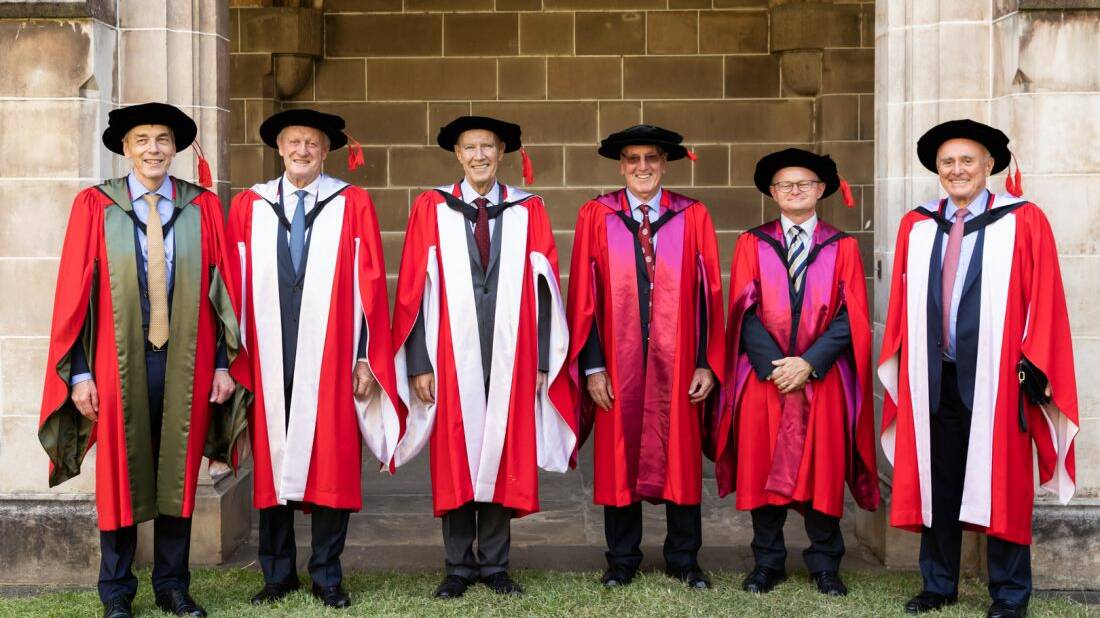
Imagine making a decision on how to spend millions of dollars based entirely on a photograph.
Snow Medical, a hugely influential donor to the University of Melbourne's medical research, says it has suspended the university from its multimillion-dollar fellowship program because it claims the university had only awarded honorary doctorates to men over the past three years.
The furore began when a photo emerged of six old white men who'd been acknowledged in such a way. Me? I'm no fan of honorary doctorates at the best of times. These blokes have already had their earthly rewards. Universities should ditch them altogether. If you want a doctorate, go ahead and do one (ask me how, she writes smugly).
But if you judged the university on the photo alone, you'd be doing the University of Melbourne a disservice. There were four others not there because of COVID, including three women and one Indigenous man who feared taking the virus back to his community.

Why am I defending an institution whose track record of misogyny has been well documented over time? Well, what Snow Medical has done with its performative decision is to destroy the hopes and livelihoods of women researchers. It's removed millions of dollars from a research pipeline which is already so masculine it should have testicles. Now I have to say Tom Snow, the chair of Snow Medical, made some excellent points when I challenged him on his decision. He says awards such as honorary doctorates matter because they inspire and are an example to others. He also says the University of Melbourne is a repeat offender. In good news, so long as the university gets its act together, it will only miss out on this funding round. Snow, to his credit, also knows that this decision has made other institutions pull their respective gendered fingers out.
But here's the background. Snow Medical has conversations with all of the institutions it funds on a regular basis, and it gives away millions of dollars to research each year. Institutions have to show improvement and support claims of diversity. That's as it should be.
But as far as I can tell (and as far as anyone there will tell me), Melbourne has dramatically improved its promotion processes and its internal grant giving. It's had recruitment drives directed at women, and five of its 10 deans are women. It's trying to improve the culture. In its last promotion round to professor, about half were women.
Look, I worked at a university as a full-time academic for a long time (and no, it's not the one to which I am currently attached). Men talk too much and have way too much institutional power. Often the women promoted in this atmosphere to run faculties are patriarchs in frocks, or what journalist Amy Remeikis calls "crumb maidens". But I'd argue that the least helpful thing you can do is to cut off funding to women, and that's exactly what Snow Medical's decision has done.
Louise Purton, a professor of medicine at the St Vincent's Institute, says her research reveals the biggest funder for medical research, the National Health and Medical Research Council, largely funds senior men. When women are funded, they are given less money. Women in the big laboratories spend years in servitude, which keeps them at junior levels and prevents their progression. The lack of funding pushes women out.
"The current funding system favours those who have been funded in the past, and there is clear evidence that has not been women," says Purton.
Gaetan Burgio, group leader in genetics at the Australian National University, has investigated the gender gap in funding for discovery projects at the Australian Research Council. He says funding largely goes to men over 50 who already have a track record in getting grants.
"These are white men over 50 who have large labs which can generate a lot of data, and all the ghostwriting is from junior women academics because on their own they can't get funding unless they are superstars," he says.
It is in this situation where the decision by Snow to ban Melbourne from its funding round lands. It lands in the laps of the very people it should be protecting. I suggested that it fund women-led projects at Melbourne in the interim. Tom Snow responded by saying that Snow Medical has not reduced its funding overall, and that it will continue to support the projects it already has in train at the university. Which is fine for those currently employed.
MORE JENNA PRICE:
Tom Snow also acknowledges that his own organisation has a bit of a way to go when it comes to diversity. That's because it needs to have people who have already run big research institutions, and like everything else in academia, track records beget track records.
I hear his commitment to institutional change. I also hear the University of Melbourne, whose spokesperson admitted a huge own goal. And Jim McCluskey, the deputy vice-chancellor for research, says he is deeply ashamed and embarrassed.
The whole thing is a catastrophe - and while I very much enjoy the innards of patriarchy being exposed, and the fact that some vice-chancellors around the nation will have trembling knees at the prospect of losing much-needed research funds - I fear that, as usual, it will be women who suffer because of these decisions.
And this is all happening in an environment where the government has already put the razor through university funding, forcing universities to sack thousands of staff. It is true women rarely get the recognition they deserve, but it is also true that when the going gets tough, women bear the load and the brunt.
- Jenna Price is a visiting fellow at the Australian National University and a regular columnist.


